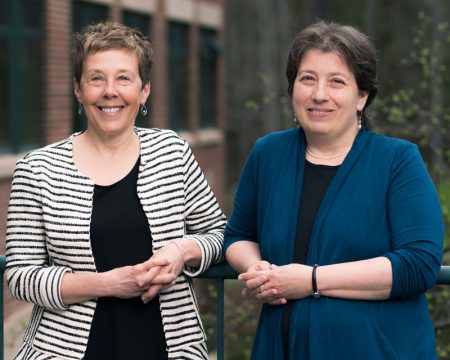A research team led by Sarah Lord, PhD, and Daisy Goodman, DNP, MPH, at Dartmouth’s Geisel School of Medicine, has been approved for a $5.3 million funding award from the Patient-Centered Outcomes Research Institute (PCORI)—to conduct comparative clinical effectiveness research on medication-assisted treatment (MAT) for pregnant women with opioid use disorders (OUD).

The award is one of nine new comparative clinical effectiveness research awards being offered by PCORI (with a total of $74 million in funding) to support research on a range of conditions that impose high burdens on patients, caregivers, and the healthcare system.
“I’m very excited that Sarah and Daisy have received this award from PCORI to address this significant public health crisis,” says Duane Compton, PhD, dean of the Geisel School of Medicine. “Their innovative research will enhance the excellent work that is underway between Geisel and Dartmouth-Hitchcock investigators and their community partners to find the most effective ways to treat opioid addiction for both mothers and their infant children.”
Northern New England has among the highest rates of opioid dependence, and opioid-related deaths, in the U.S. with prevalence highest and growing among those between 18 and 35 years of age. In this region, 5-8 percent of newborns have mothers with an opioid use disorder, putting them at much greater risk for poor outcomes such as preterm birth and long-term hospitalization for neonatal withdrawal and other complications.
For pregnant women with opioid use disorder, MAT—which combines maintenance medication with psychosocial services—has been shown to significantly reduce these risks. However, it can be difficult for pregnant women to find MAT providers. This has prompted a growing number of maternity care providers to prescribe MAT in their own practices, while other providers follow the traditional approach of referring patients to specialty MAT programs.
For the five-year project, the team will compare the outcomes of two medication-assisted treatment models of care.
“Our research questions reflect what women affected by opioid use disorder and their care providers indicated as most important to them,” explains Lord, an assistant professor of psychiatry at Geisel and director of the Dissemination and Implementation Core of the Dartmouth Center for Technology and Behavioral Health (CTBH). “We are interested in whether integrated care models, where women receive maternity care and treatment for OUD together in the same practice, are more effective than models where women receive maternity care from one practice and are referred to OUD treatment at another location. These models have not been directly compared in research studies of maternity care for women with OUD. We’re hoping the results of our study will inform both practice and policy with regard to services for women and their infant children.”
“We have a wonderful network of 21 partners across New Hampshire, Vermont, and Maine that includes: maternity care, perinatal, and pediatric providers; addiction treatment clinicians; state Medicaid and policy representatives; community advocates; researchers; and pregnant and parenting women with lived experience with opioid use,” says Goodman, who directs women’s health services for the Moms in Recovery program at Dartmouth-Hitchcock Medical Center, and is a clinical assistant professor of obstetrics and gynecology, as well as an adjunct assistant professor of health policy and clinical practice at Geisel. “Our partners will be integrally involved in all aspects of the study, from planning and recruitment, to data collection, analysis, and presentation of results. This collaborative research approach is what we believe will make this project a success.”
The Geisel study was selected through a PCORI funding announcement specifically focused on the delivery of MAT for pregnant women with opioid use disorder. The rate of this disorder has increased among pregnant women in parallel with the current opioid epidemic.
“This project led by Sarah Lord and Daisy Goodman, along with a multidisciplinary team and a tri-state partner network, will provide new insights into models of care that may be most effective for mothers with opioid use disorders and their infants—a timely and significant issue in our region and in our nation,” says Lisa Marsch, PhD, the Andrew G. Wallace Professor of Psychiatry and director of the CTBH at Geisel, who is a leading researcher on the opioid crisis.
Input from a variety of stakeholders, including the Medicaid Medical Directors Network, midwives, and obstetricians, identified this research gap and helped PCORI to refine its call for research proposals.
“The project was selected for PCORI funding for its potential to fill an important gap in our understanding of various medication-assisted treatment delivery models and to give pregnant women with opioid use disorder information that can help them weigh the effectiveness and safety of their care options,” says PCORI Executive Director Joe Selby, MD, MPH. “We look forward to following the study’s progress and working with the Geisel researchers to share the results.”
The Geisel team’s award has been approved pending completion of a business and programmatic review by PCORI staff and issuance of a formal award contract. This is the sixth PCORI award currently held by Geisel.
PCORI is an independent, non-profit organization authorized by Congress in 2010 with the mission of funding research that will provide patients, their caregivers, and clinicians with the evidence-based information needed to make better-informed healthcare decisions.
About the Geisel School of Medicine at Dartmouth
Founded in 1797, the Geisel School of Medicine at Dartmouth strives to improve the lives of the communities it serves through excellence in learning, discovery, and healing. The Geisel School of Medicine is renowned for its leadership in medical education, healthcare policy and delivery science, biomedical research, global health, and in creating innovations that improve lives worldwide. As one of America’s leading medical schools, Dartmouth’s Geisel School of Medicine is committed to training new generations of diverse leaders who will help solve our most vexing challenges in healthcare.